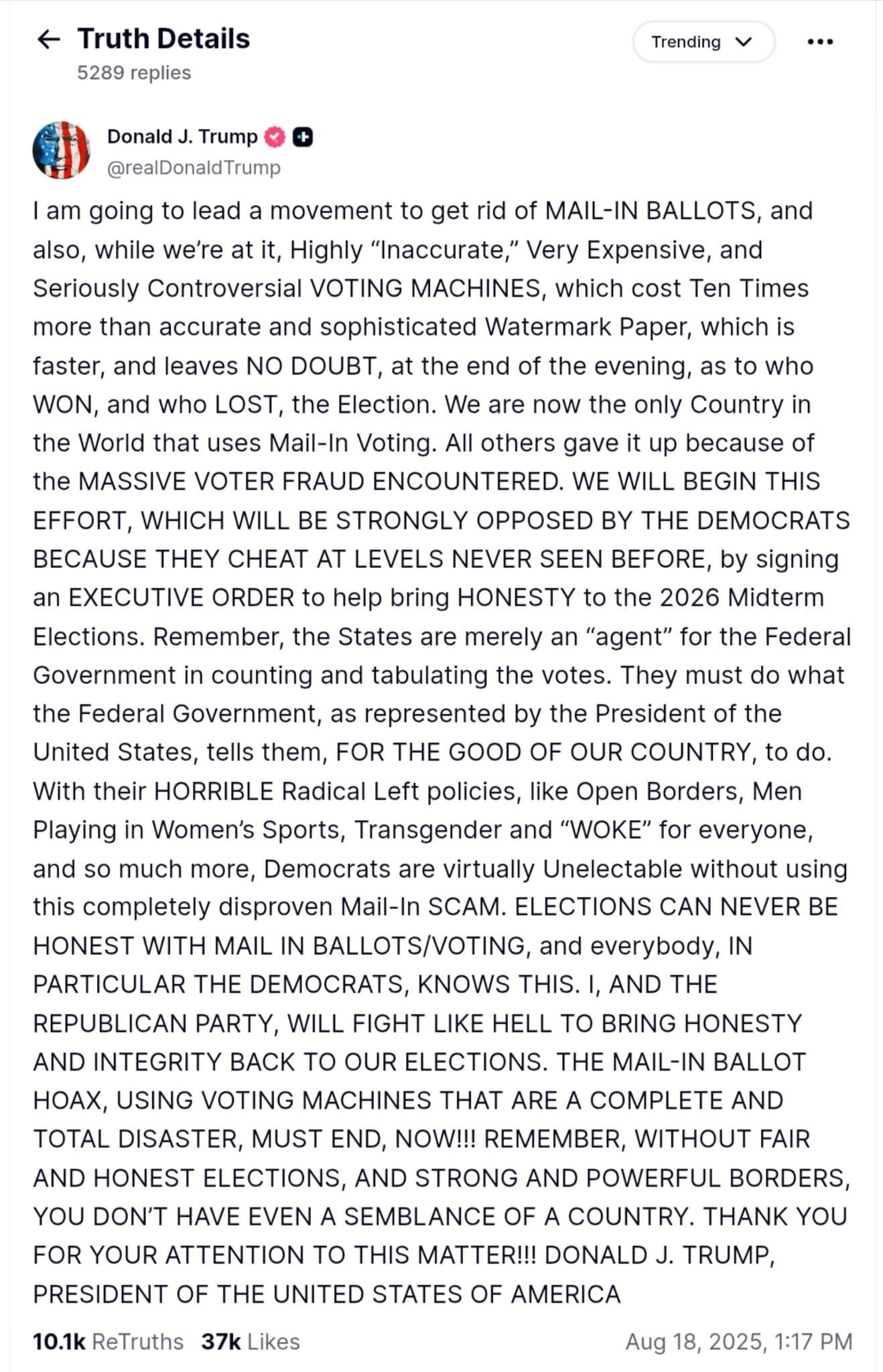Trump Launches Movement to Ban Mail-In Voting, Advocates for Watermarked Ballots Ahead of 2026 Midterms
In a bold announcement on Truth Social, former President Donald Trump declared his intention to spearhead a movement aimed at abolishing mail-in ballots and electronic voting machines in preparation for the 2026 midterm elections. Citing what he describes as "massive voter fraud," Trump proposed replacing current voting methods with watermarked paper ballots, which he claims would provide quicker, more cost-effective, and more reliable election results. This announcement follows a controversial executive order on election procedures issued in March 2025 that was ultimately blocked. Trump"s assertions about mail-in voting have raised eyebrows, particularly his claim that the United States is the only nation employing such a system, despite numerous democracies across the globe utilizing regulated postal ballots.
Background & Context
The debate surrounding mail-in voting has been a contentious issue in American politics, especially following the 2020 presidential election. Trump has consistently alleged that widespread fraud occurred during that election, a claim that has been widely debunked by election officials and independent studies. His latest initiative comes as states prepare for the upcoming midterms, where control of Congress hangs in the balance. The push for watermarked paper ballots appears to be a strategic maneuver to galvanize his base and consolidate support within the Republican Party, which has increasingly aligned with Trump"s skepticism of mail-in voting.
Key Developments
Trump"s announcement on Truth Social emphasized the need for "definitive election outcomes," which he believes can only be achieved through the proposed watermarked ballots. He stated, "We need to ensure that our elections are secure and that every vote counts." Trump"s framing of mail-in voting as a threat to democracy is likely to resonate with his supporters, who have been vocal about election integrity. However, his suggestion that states should act as "agents" of the federal government in enforcing federal directives on vote counting is expected to ignite legal disputes, given the constitutional authority granted to states over their own election processes.
In addition to his focus on mail-in ballots, Trump’s movement comes at a time when various states are considering their own voting regulations, leading to a patchwork of laws that could complicate the electoral landscape. The implications of Trump"s push will likely extend beyond the midterms, influencing future elections and the broader conversation about voting rights in the United States.
Broader Impact
The ramifications of Trump"s initiative could be profound, not only for the 2026 midterms but also for the future of voting rights in America. Critics, including Democrats and voting rights advocates, are gearing up for a fierce battle against any attempts to roll back mail-in voting. Organizations dedicated to protecting voting access have expressed concerns that Trump"s movement could disenfranchise millions of voters, particularly those who rely on mail-in ballots due to health, mobility, or logistical issues.
Experts have pointed out that many democracies around the world successfully use mail-in voting without significant issues. For instance, countries like Canada and Germany have established systems that include mail-in ballots as part of their electoral process. This historical context raises questions about the validity of Trump"s claims and the motivations behind his movement. As previously reported, the landscape of voting rights is constantly evolving, and Trump"s latest push could mark a significant shift in how elections are conducted in the U.S.
What"s Next
As Trump mobilizes support for his cause, the political landscape leading up to the 2026 midterms will likely become increasingly polarized. Republican state legislatures may be pressured to adopt stricter voting regulations, while Democrats will likely counter with efforts to protect and expand mail-in voting access. The upcoming months will be crucial as states begin to outline their electoral procedures, and the implications of Trump"s movement unfold.
Legal experts anticipate a series of court challenges if states attempt to implement Trump"s proposed changes, potentially setting the stage for landmark rulings on voting rights and election integrity. The outcome of these developments could have lasting effects, influencing not just the midterms but also shaping the political discourse around elections for years to come. Stakeholders on both sides of the aisle are bracing for a contentious fight over the fundamental principles of democracy and voter access in the United States.




![[Video] Putin ready to refrain from deep strikes in Ukraine during elections](/_next/image?url=%2Fapi%2Fimage%2Fthumbnails%2Fthumbnail-1766158260919-wednc8-thumbnail.jpg&w=3840&q=75)


![[Video] Gunfire between Iraqi security forces and Sadr militias in Baghdad](/_next/image?url=%2Fapi%2Fimage%2Fthumbnails%2Fthumbnail-1768343508874-4redb-thumbnail.jpg&w=3840&q=75)
